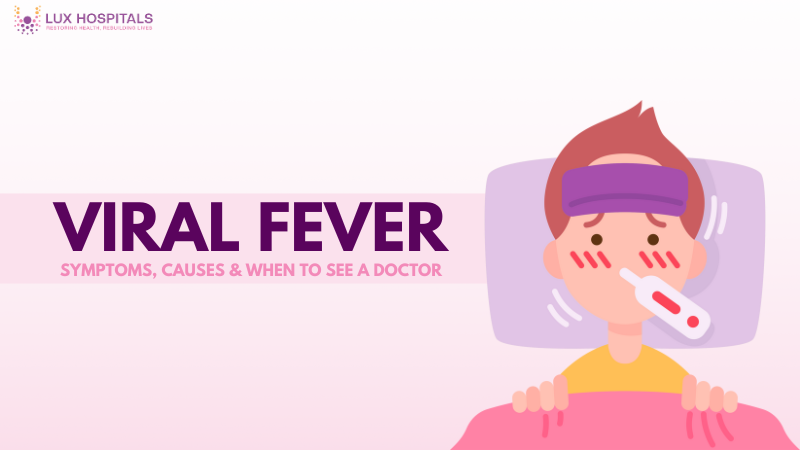Viral Fever: Causes, Symptoms & Recovery Tips

People of all ages are susceptible to viral fever, a common illness that often results in sudden spikes in temperature, fatigue, and muscle aches. It is typically brought on by viral infections that are transmitted via contact, the air, or insect bites. Although the majority of instances are moderate and self-limiting, you can effectively manage the illness and avoid complications by being aware of its causes, symptoms, and available treatments.
What You Need to Know About Viral Fever
Viral fever is a common health condition caused by a viral infection, characterized by an elevated body temperature and other systemic symptoms. It can affect people of all ages and often spreads through the air, contaminated surfaces, or contact with infected individuals. While most cases are mild, understanding the signs, causes, and treatments can help you recover faster and prevent complications.
What is a Viral Fever?
Viral fever refers to a group of viral infections that cause a rise in body temperature, along with symptoms such as headaches, fatigue, muscle aches, and chills. Your body’s natural defense against viruses that enter your bloodstream is this. These fevers can be caused by a variety of viruses, including enteroviruses, dengue, and influenza.
Common viruses causing viral fever include:
- Influenza virus (flu)
- Dengue virus
- Adenovirus
- Enterovirus
- COVID-19 (SARS-CoV-2)
Symptoms of Viral Fever
Symptoms of viral fever vary depending on the virus, but usually include:
- High body temperature (above 100.4°F)
- Body pain or muscle aches
- Chills and shivering
- Headache
- Fatigue and weakness
- Cough, sore throat, or runny nose
- Nausea or vomiting in some cases
These symptoms typically last 3–5 days but can persist longer depending on the severity of the infection.
Causes and Transmission
Different viruses can infect the body in other ways, leading to viral fever. These include personal contact, contaminated food or water, airborne droplets, and insect bites, such as those from mosquitoes (e.g., dengue).
Key ways viral fever spreads:
- Breathing in infected droplets from coughs/sneezes
- Touching your face after coming into contact with contaminated surfaces
- Vectors of insects, such as ticks and mosquitoes
- Sharing personal items with infected individuals
Diagnosis of Viral Fever
A clinical diagnosis is based on symptoms, but doctors may recommend tests like
- Complete Blood Count (CBC)
- Dengue NS1 antigen test
- Influenza swab test
- COVID-19 test (RT-PCR)
Physicians distinguish between bacterial infections, which often require antibiotics, and viral infections, which usually result in fevers.
Treatment Options for Viral Fever
There’s no specific cure for most viral fevers, as they usually resolve on their own. Treatment focuses on relieving symptoms and supporting the immune system.
Common treatments include:
- Paracetamol or ibuprofen to reduce fever and pain
- Plenty of fluids to prevent dehydration
- Rest to help the body recover
- Light, nutritious meals
In more severe cases, hospitalization may be necessary. Unlike viral fevers, bacterial infections, which may necessitate antibiotics, are hazardous for young children, the elderly, or those with compromised immune systems.
Home Remedies for Faster Recovery
Home care plays a vital role in managing viral fever effectively:
- Sip warm liquids, such as herbal teas and soups, to help soothe your throat.
- Use cold compresses to manage high temperature
- Inhale steam to relieve nasal congestion
- Stay in a cool, ventilated room
- Use saline nasal drops for a blocked nose
Always consult a doctor if symptoms worsen or persist for more than 4–5 days.
When to See a Doctor?
Even though the majority of viral fevers are not severe, you should consult a physician if you :
- High fever lasting more than 3 days
- Difficulty breathing
- Severe headache or neck stiffness
- Skin rashes or bleeding (possible dengue)
- Confusion or drowsiness
These could indicate a more serious infection or complications needing medical attention.
Prevention Tips for Viral Fever
Increasing your immunity and limiting your exposure to viruses are two ways to prevent viral fever.
Useful prevention tips:
- Wash your hands regularly with soap and water
- Avoid crowded places during outbreaks
- Wear masks during flu season or when sick
- Use mosquito repellents and nets
- Consume a healthy, vitamin- and mineral-rich diet.
- Get vaccinated for preventable viral infections.
Recovery and Immunity Boosting
Rest and a healthy diet are essential for recovering from viral fever to boost immunity and restore lost energy.
Tips to boost recovery:
- Get at least 7–8 hours of sleep
- Eat fruits rich in Vitamin C, like oranges, guava, and kiwi
- Include zinc-rich foods like nuts and seeds
- Stay hydrated with water, ORS, and coconut water
- Avoid strenuous activities until full recovery
Conclusion
Understanding and managing viral fever is essential for a healthy recovery. Although it typically resolves on its own, good cleanliness, relaxation, and care are crucial in reducing symptoms and stopping its spread. Don’t hesitate to consult your doctor if your symptoms worsen or persist for an extended period. You can live a healthier life and prevent recurrent episodes of viral fever by being knowledgeable, practicing good hygiene, and strengthening your immune system.
Frequently Asked Questions
Viruses cause viral fever, which typically resolves on its own, whereas bacteria cause bacterial fever, which may require antibiotics. The symptoms can be similar, but diagnostic tests help in identification.
Most cases of viral fever last for 3–5 days. However, depending on the person's condition and the specific virus strain, weakness and exhaustion may persist for several weeks or longer.
Yes, mild viral fever cases can be managed at home with rest, fluids, and fever-reducing medications. Consult a healthcare professional if your symptoms worsen or persist.
Depending on the virus, viral fever can indeed spread. Because it spreads through contaminated surfaces, personal contact, or cough droplets, sanitation and isolation are essential.
No, antibiotics are ineffective against viruses. Taking them unnecessarily can lead to resistance and adverse consequences. Only take them as directed by a physician to treat a bacterial illness.
Yes, children are more vulnerable to viral fever due to weaker immunity and increased exposure in schools or daycare centers. Prompt care and hydration help manage their symptoms effectively.




















